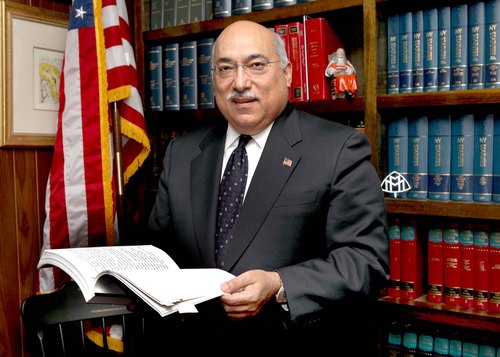Sixty- six years ago, on January 26, 1950, India‘s Constitution came into force – replacing far away England’s Government of India Act of 1935.
That India chose Dr. Ambedkar to give birth to the legal architecture that would unleash every Indian’s best urges while minimizing their worst – a durable compact between India’s citizens and their government – is perhaps the best compliment any nation can bestow upon a single individual to do the job that took all of America’s best in Philadelphia in 1789 after a tumultuous 1776.
Plato, the cherished author of the Republic, laid out a Greek merit-based caste system – albeit, it was never so labeled. While reasonable minds can differ if India borrowed from Plato, or Plato borrowed from India, the simple fact is that Plato and the Indian caste system are inseparable. What is also true is that rules without individual flexibility become rigid and unfair – which is why we have the noble judiciary toiling to fashion justice, one case at a time. India’s caste system over the thousands of years robbed India and all Indians of the right to be really proud – for within the Indian society was a system that denigrated the individual based upon status, not merit or ability as Plato envisioned and perhaps as India originally thought. Hat tip to Justice Scalia’s Originalist constitutional philosophy.
Along came India’s Thomas Jefferson and Ben Franklin rolled into one – a man educated at Columbia University – a man who took the United States Constitution, clarified by Supreme Court precedents, both lofty and slavery-sinful, and unleashed upon India humanity’s then best humanistic covenant – by and between the people, and with their government. He even included “sunset clauses” for remedial benefits, as in affirmative action, believing 50 years before Justice Sandra Day O’Connor did in providing that affirmative actions must sunset in 25 years – as they offend the Equal Protection Clause.
The wisdom that is embedded in Constitutions is worthy of hot debate, on a perpetual basis, if citizens wish their aggregate view to find voice in judicial decrees safeguarding societal compacts. In a republic, it is always the noble judiciary that safeguards a nation’s soul – even as the two political branches, executive and legislative, give utterance to the views of the citizenry.
For those who marvel at India, a successful secular democracy with an economy that harnesses the American Dream as if it had been dreamt by every Indian in technicolor, it should not fail comprehension that India paid the heavy price in blood to Lord Cornwallis for his loss to General George Washington or that America’s Founding Fathers created the template for India’s constitution through the learned, wise, courageous and tempered Dr. Ambedkar.
It is India’s pride that every religion has found her soil to be both welcoming and fertile – in fact, for several millennia, India was the freest market for ideas – merely mortal and superbly divine. That many a religion sprouted there or sought shelter there is pretty remarkable too.
Dr. Ambedkar’s ultimate gift is that Indians and their elected representatives can have robust disagreements – without fear of suppression or punishment – thereby making every Indian an owner of his or her government. What Abraham Lincoln promised at Gettysburg – a government “of, by and for” the people exists in India.
As an American lawyer, I take partial ownership of India’s Constitution with great pride; as an Indian-American, I take great pride in America’s exceptionalism – after all there is a natural alliance between United States and India, one that was decreed by patriots in both nations seeking to live free forever.
So to everyone who loves Abraham Lincoln – behold over a billion people living peacefully under law and who dare to own their government.
While Sureshbhai Patel’s case was lost, something I predicted a year ago given the anemic lawsuit filed and the municipality’s clever liability avoiding chess move of firing Parker, it’s not America’s fault – after all right here in America, we won Krittika Biswas, withdrawal of frivolous charges against Ambassador Prabhu Dayal, forcing Ambassador Nancy Powell into retirement given her core misconduct in the Devyani mess, and completely protected India’s sovereignty by winning dismissals of cases against Indian Congress party and Mrs. Sonia Gandhi. Unlike Sureshbhai, we held New York City liable for Krittika’s loss of her federal civil rights. The fault lies not in our stars, but in ourselves for not knowing the law in a nation of laws.
Happy Republic Day!
